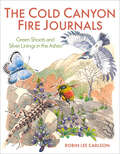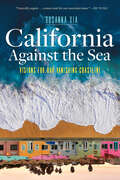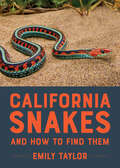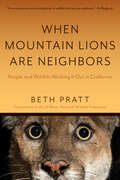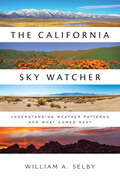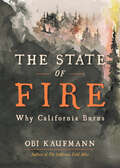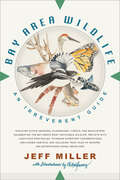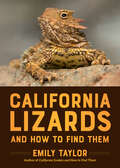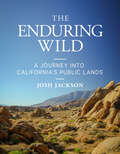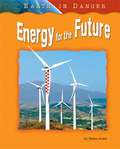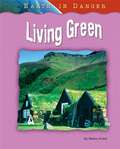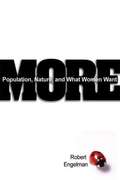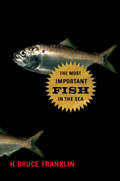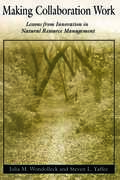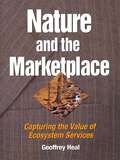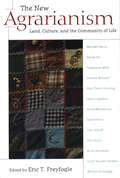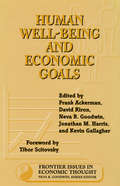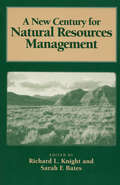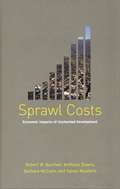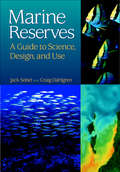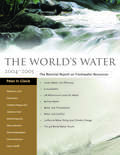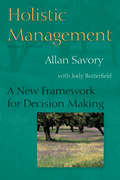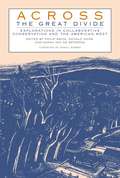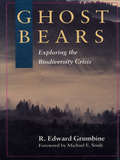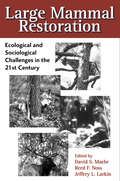- Table View
- List View
The Cold Canyon Fire Journals: Green Shoots and Silver Linings in the Ashes
by Robin Lee CarlsonBraiding together illustration, observation, and reportage, artist and naturalist Robin Lee Carlson offers a watershed work that will forever change how we live with wildfire in the WestWhen the nature reserve at Cold Canyon went up in flames—a casualty of California’s raging fire seasons—Robin Lee Carlson embarked on a five-year journey to learn the legacy of the burn. Spurred by scientific curiosity, Carlson’s deep digs into the natural history of this fire-swept ecosystem unearth mind-bending revelations about nature’s wild wisdom. Her transformative story of fire as a force for renewal underscores what scientists are urgently working to understand: that in California’s wildfire ecologies, fire functions as an elemental power that does not destroy the diverse habitats of California, but regenerates them. Richly illustrated in pen, ink, and watercolor, this snapshot of Cold Canyon’s wildlife emerging from the ashes introduces the reader to the wonder of ecological kinship and its cycles in our wild lands. Carlson’s artistic and scientific journey ultimately leads her (and us) to a new understanding of how we must live in relationship to fire and to the land. With fire suppression and climate change undermining the essential regenerative work of fire in our ecosystem, Carlson’s story is an urgent one—one that shows us how cultivating intimacy with our natural world teaches us what we need to do to sustain it.
California Against the Sea: Visions for Our Vanishing Coastline
by Rosanna XiaPEN/E.O. Wilson Literary Science Writing Award Winner * Golden Poppy Award Winner for Nonfiction * California Book Awards Gold Medal Winner * A Great Read from Great Places selected by the Library of Congress * A San Francisco Chronicle Best Book of the Year * American Book Award Winner * 2024 American Energy Society's Energy Writer of the Year * An Architect's Newspaper Best Book of 2023 * 2024 Nautilus Book Awards Silver Medal WinnerNow in paperback: a "deeply researched and reported" (San Francisco Chronicle) exploration of sea level rise in California that "breathes exquisite detail and dialogue" (Science Magazine) into the subject."Viscerally urgent, thoroughly reported, and compellingly written—a must-read for our uncertain times." —Ed Yong, author of An Immense World"When do seawalls make sense? And when is it better to give in to the tides? [...] In California Against the Sea, Xia [...] writes about the difficult realities of trying to incorporate fairness into our tally of costs and benefits." —The New YorkerAlong California's 1,200-mile coastline, the overheated Pacific Ocean is rising and pressing in, imperiling both wildlife and the maritime towns and cities that 27 million people call home. In California Against the Sea, Los Angeles Times coastal reporter Rosanna Xia asks: As climate chaos threatens the places we love so fiercely, will we finally grasp our collective capacity for change?Xia, a Pulitzer Prize finalist, investigates the impacts of engineered landscapes, the market pressures of development, and the ecological activism and political scrimmages that have carved our contemporary coastline—and foretell even greater changes to our shores. From the beaches of the Mexican border up to the sheer-cliffed North Coast, the voices of Indigenous leaders, community activists, small-town mayors, urban engineers, and tenacious environmental scientists commingle. Together, they chronicle the challenges and urgency of forging a climate-wise future. Xia's investigation takes us to Imperial Beach, Los Angeles, Pacifica, Marin City, San Francisco, and beyond, weighing the rivaling arguments, agreements, compromises, and visions governing the State of California’s commitment to a coast for all. Through graceful reportage, she charts how the decisions we make today will determine where we go tomorrow: headlong into natural disaster, or toward an equitable refashioning of coastal stewardship.
California Snakes and How to Find Them
by Emily TaylorA herpetologist introduces budding snake enthusiasts to the wonders of California snakes."I've loved snakes since childhood and am thrilled to now have this gorgeous book as my companion to finding snakes wherever a walk on the wild side takes me." —Amy Tan, author of The Joy Luck Club and The Backyard Bird ChroniclesFear of snakes is one of the most common phobias in the world, yet step into any local zoo and you'll find the snake pit to be among these menageries' greatest attractions. In this entrancing ode to the charms of California's legless reptiles, rattlesnake wrangler Emily Taylor shares her knowledge, enthusiasm, and advice for getting to know our slithering neighbors, dispelling the usual misapprehensions that surround them and celebrating their striking biological traits along the way.Featuring profiles of the nearly 50 fork-tongued species that burrow and coil in California's diverse habitats, and containing tips for serpent seekers—including identification guides and handling advice—California Snakes and How to Find Them delves into the longstanding myths and latest natural history research on our ophidian friends of the West. Taylor showcases the biodiversity of California's snakes, from the Common Garter to the fetchingly pink Rosy Boa to the elusive Alameda Striped Racer, illustrated with more than 100 detailed photographs. Supported with critical insights—such as what to do during a venomous encounter, and an exploration of the seemingly simple question, What is a snake?—this guide is the perfect companion for both the seasoned naturalist and the budding snake enthusiast.
When Mountain Lions Are Neighbors: People and Wildlife Working It Out in California (With a New Preface)
by Beth PrattNow updated with a new preface: a full-color celebration of coexistence with California's iconic wildlife.Wildness beats in the heart of California's urban areas, and across the state Californians are taking action to recast wildlife as an integral part of our everyday lives. In Los Angeles, residents rallied to build one of the largest wildlife crossings in the world because of the plight of one lonely mountain lion named P-22. Porpoises cavort in San Francisco Bay again because of a grassroots effort to clean up a waterway that was once a toxic mess. Yosemite's park staff and millions of visitors have mobilized to keep its famed bears wild. And after a near century-long absence, Californians are welcoming wolves back to the state, inspired by the remarkable journey of the wolf OR-7. When Mountain Lions Are Neighbors explores this evolving dynamic between humans and animals. Now updated with a new preface, these inspiring stories celebrate a new model for wildlife conservation: coexistence.
The California Sky Watcher: Understanding Weather Patterns and What Comes Next
by William A. SelbyRide across California on the back of the wind and learn about the dramatic impact that seasonal weather and climate change have on the Golden State."Selby's greatest gift to readers is to reveal the climate as an indomitable equalizer." —Los Angeles TimesOften stereotyped as the land of unflaggingly perfect weather, California has a world-renowned reputation for sunny blue skies and infinitely even-keeled temperatures. But the real story of the state's weather is vastly more complex. From the scorching heat of Death Valley to the coastal redwoods' dripping in dew, California is home to a dizzying array of landscapes and bespoke weather patterns. In The California Sky Watcher, earth scientist William A. Selby takes readers on a journey through the seasons and across the state, exploring the atmospheric science that connects us all under our single sky dome.With more than 125 photographs, diagrams, and explanatory charts, Selby guides us through the grand cycles that govern the world we see, feel, and hear every day, from the cirrus clouds that swirl overhead to the breezes that beckon us outside. Unraveling the mysteries behind the state's fog, floods, fires, droughts, and snowstorms, Selby shares his love affair with the sky and reveals what these changeable energies forecast for the future of California's climate.
The State of Fire: Why California Burns
by Obi KaufmannHow do we live with fire? From the creator of The California Field Atlas, a book of stewardship, resilience, and hope.Fire is an essential part of California's ecology. Humans have been using it to shape the California landscape for thousands of years. But today many Californians' relationship to fire is one of fear. Obi Kaufmann, author of the best-selling California Field Atlas, now asks: How do we live with fire? What makes fire essential to a healthy and biodiverse Golden State, and how do we benefit from its teachings? With the same solution-minded ethic as his much-admired The State of Water: Understanding California's Most Precious Resource, Kaufmann presents fire as a force of regeneration rather than apocalypse. He considers the long history of ecological burns, the varied ways fire behaves across the state, and the lessons we can learn from California's largest fires of recent decades.Packed with Kaufmann's signature watercolor maps and paintings, The State of Fire confronts one of California's most pressing social and ecological challenges. From this maelstrom Kaufmann emerges to share a deepened love for the natural world—and a refreshingly hopeful vision of California's future.
Bay Area Wildlife: An Irreverent Guide
by Jeff MillerLearn about the wildlife of the Bay Area from a lifelong protector of endangered species, and enjoy the wild ride.Jeff Miller's quirky guide to the coolest animal neighbors in the Bay Area will have you gawking at elk, whooping with cranes, and crowning yourself a crossing guard for newts before you know it. Join Jeff on a local safari to meet more than sixty species of mammals, birds, fish, reptiles, amphibians, and insects, and discover the fascinating and sometimes bizarre mating, feeding, and athletic antics of our most charismatic animals.Portraits by Obi Kaufmann, the renowned conservationist artist who created The California Field Atlas, bring each animal to vivid life alongside fun facts, comical photos, and maps to help you scope out the best spots to find your furred, feathered, slimy, and slithery friends. Imbued with the author’s deep compassion for the well-being of our local fauna, Bay Area Wildlife reveals why each of these creatures matters, as well as the threats that loom over our region's incredible biodiversity.
California Lizards and How to Find Them (California Herping Guides)
by Emily TaylorThe author of California Snakes and How to Find Them invites budding reptile enthusiasts into a wonderland of lizards."This guide joyfully celebrates the beauty and quirkiness of our native lizards." —John Muir LawsLizards: they are cute, endearing, and mind-bogglingly diverse, and yet they are so easy to overlook among California’s natural abundance. Start watching them, though, and a wonderland of lizard life appears. In California Lizards and How to Find Them, lizard lover Emily Taylor profiles over 60 native and introduced species, from California's iconic Western Fence Lizard to the adorable Desert Iguana to the chonky Ringed Wall Gecko. With her expert knowledge and joyous, laugh-out-loud writing, Taylor provides tips for finding, watching, and responsibly catching lizards. She offers absorbing insights on lizard evolution, and she explains the toll of invasive lizard species on California's ecosystems. Featuring more than 100 full-color photographs, and designed for easy use in everyday life, this is the ideal guide for budding reptile enthusiasts and longtime naturalists alike.
The Enduring Wild: A Journey into California's Public Lands
by Josh JacksonA galvanizing road trip across California's immense public wilderness from a beloved adventurer."The Enduring Wild is a call to look beyond the surface, embrace the deep connections that tie us to our public lands, and commit to safeguarding them for future generations." —QT Luong, author of Treasured Lands: A Photographic Odyssey Through America's National ParksIt all began with a camping trip. Outdoor enthusiast Josh Jackson had never heard of "BLM land" before a casual recommendation from a friend led him to a free campsite in the desert—and the revelation that over 15 million acres of land in California are owned collectively by the people. In The Enduring Wild, he takes us on a road trip spanning thousands of miles, crisscrossing the Golden State to seek out every parcel of public wilderness therein belonging to the federal Bureau of Land Management, from the Pacific shores of the King Range down to the Mojave Desert. Over mountains, across prairies, and through sagebrush, Jackson unravels the stories of these lands. He tells of the Indigenous peoples who have called them home for millennia, of the extractivist threats that imperil them today, and of the grassroots organizers and political champions who have rallied to their common defense to uphold the radical mandate to protect these natural treasures for generations to come. For the adventurers, campers, explorers, map readers, road trippers, nature enthusiasts, and public lands lovers out there, The Enduring Wild is an indispensable invitation to know these places more deeply and to embrace our common inheritance. Illustrations by Rebekah Nolan.
Energy for the Future (Earth in Danger)
by Helen OrmeBurning fossil fuels, such as oil and coal, may be accelerating Earth's climate change. How can we develop clean, renewable sources of energy and reduce our dependence on fossil fuels? Energy for the Future clearly presents the pros and cons of alternative energy sources-- from wind, water, and solar power to bio-fuels, hydrogen fuel cells, and nuclear power. A section in the back of the book will inspire young environmentalists by suggesting ways they can help protect their planet.
Living Green (Earth in Danger)
by Helen OrmeFrom hybrid cars to energy-efficient light bulbs, the green movement has generated interest in lifestyle changes that help preserve and protect the environment. Living Green pairs easy-to-read text with vibrant photos to engage kids as they explore ways to maintain our natural resources for future generations. A section in the back of the book will inspire young environmentalists by suggesting ways they can help protect their planet.
More: Population, Nature and What Women Want
by Robert EngelmanIn the capital of Ghana, a teenager nicknamed "Condom Sister" trolls the streets to educate other young people about contraception. Her work and her own aspirations point to a remarkable shift not only in the West African nation, where just a few decades ago women had nearly seven children on average, but around the globe. While world population continues to grow, family size keeps dropping in countries as diverse as Switzerland and South Africa. The phenomenon has some lamenting the imminent extinction of humanity, while others warn that our numbers will soon outgrow the planet's resources. Robert Engelman offers a decidedly different vision--one that celebrates womens' widespread desire for smaller families. Mothers aren't seeking more children, he argues, but more for their children. If they're able to realize their intentions, we just might suffer less climate change, hunger, and disease, not to mention sky-high housing costs and infuriating traffic jams. In More, Engelman shows that this three-way dance between population, womens' autonomy, and the natural world is as old as humanity itself. He traces pivotal developments in our history that set population--and society--on its current trajectory, from hominids' first steps on two feet to the persecution of 'witches' in Europe to the creation of modern contraception. Both personal and sweeping, More explores how population growth has shaped modern civilization --and humanity as we know it. The result is a mind-stretching exploration of parenthood, sex, and culture through the ages. Yet for all its fascinating historical detail, More is primarily about the choices we face today. Whether society supports women to have children when and only when they choose to will not only shape their lives, but the world all our children will inherit.
The Most Important Fish in the Sea: Menhaden and America
by H. Bruce FranklinIn this brilliant portrait of the oceans' unlikely hero, H. Bruce Franklin shows how menhaden have shaped America's national--and natural--history, and why reckless overfishing now threatens their place in both. Since Native Americans began using menhaden as fertilizer, this amazing fish has greased the wheels of U.S. agriculture and industry. By the mid-1870s, menhaden had replaced whales as a principal source of industrial lubricant, with hundreds of ships and dozens of factories along the eastern seaboard working feverishly to produce fish oil. Since the Civil War, menhaden have provided the largest catch of any American fishery. Today, one company--Omega Protein--has a monopoly on the menhaden "reduction industry." Every year it sweeps billions of fish from the sea, grinds them up, and turns them into animal feed, fertilizer, and oil used in everything from linoleum to health-food supplements. The massive harvest wouldn't be such a problem if menhaden were only good for making lipstick and soap. But they are crucial to the diet of bigger fish and they filter the waters of the Atlantic and Gulf coasts, playing an essential dual role in marine ecology perhaps unmatched anywhere on the planet. As their numbers have plummeted, fish and birds dependent on them have been decimatedand toxic algae have begun to choke our bays and seas. In Franklin's vibrant prose, the decline of a once ubiquitous fish becomes an adventure story, an exploration of the U.S. political economy, a groundbreaking history of America's emerging ecological consciousness, and an inspiring vision of a growing alliance between environmentalists and recreational anglers.
Making Collaboration Work: Lessons From Innovation In Natural Resource Management
by Julia M. Wondolleck Steven Lewis YaffeeAcross the United States, diverse groups are turning away from confrontation and toward collaboration in an attempt to tackle some of our nation's most intractable environmental problems. Government agencies, community groups, businesses, and private individuals have begun working together to solve common problems, resolve conflicts, and develop forward-thinking strategies for moving in a more sustainable direction.Making Collaboration Work examines those promising efforts. With a decade of research behind them, the authors offer an invaluable set of lessons on the role of collaboration in natural resource management and how to make it work. The book: explains why collaboration is an essential component of resource management describes barriers that must be understood and overcome presents eight themes that characterize successful efforts details the specific ways that groups can use those themes to achieve success provides advice on how to ensure accountability Drawing on lessons from nearly two hundred cases from around the country, the authors describe the experience in practical terms and offer specific advice for agencies and individuals interested in pursuing a collaborative approach. The images of success offered can provide ideas to those mired in traditional management styles and empower those seeking new approaches. While many of the examples involve natural resource professionals, the lessons hold true in a variety of public policy settings including public health, social services, and environmental protection, among others.Making Collaboration Work will be an invaluable source of ideas and inspiration for policy makers, managers and staff of government agencies and nongovernmental organizations, and community groups searching for more productive modes of interaction.
Nature and the Marketplace: Capturing The Value Of Ecosystem Services
by Geoffrey HealIn recent years, scientists have begun to focus on the idea that healthy, functioning ecosystems provide essential services to human populations, ranging from water purification to food and medicine to climate regulation. Lacking a healthy environment, these services would have to be provided through mechanical means, at a tremendous economic and social cost.Nature and the Marketplace examines the controversial proposition that markets should be designed to capture the value of those services. Written by an economist with a background in business, it evaluates the real prospects for various of nature's marketable services to "turn profits" at levels that exceed the profits expected from alternative, ecologically destructive, business activities. The author: describes the infrastructure that natural systems provide, how we depend on it, and how we are affecting it explains the market mechanism and how it can lead to more efficient resource use looks at key economic activities -- such as ecotourism, bioprospecting, and carbon sequestration -- where market forces can provide incentives for conservation examines policy options other than the market, such as pollution credits and mitigation banking considers the issue of sustainability and equity between generations .Nature and the Marketplace presents an accessible introduction to the concept of ecosystem services and the economics of the environment. It offers a clear assessment of how market approaches can be used to protect the environment, and illustrates that with a number of cases in which the value of ecosystems has actually been captured by markets.The book offers a straightforward business economic analysis of conservation issues, eschewing romantic notions about ecosystem preservation in favor of real-world economic solutions. It will be an eye-opening work for professionals, students, and scholars in conservation biology, ecology, environmental economics, environmental policy, and related fields.
The New Agrarianism: Land, Culture, and the Community of Life
by Eric T. FreyfogleThe engaging writings gathered in this new book explore an important but little-publicized movement in American culture -- the marked resurgence of agrarian practices and values in rural areas, suburbs, and even cities. It is a movement that in widely varied ways is attempting to strengthen society's roots in the land while bringing greater health to families, neighborhoods, and communities. The New Agrarianism vividly displays the movement's breadth and vigor, with selections by such award-winning writers as Wendell Berry, William Kittredge, Stephanie Mills, David Orr, Scott Russell Sanders, and Donald Worster. As editor Eric Freyfogle observes in his introduction, agrarianism is properly conceived in broad terms, as reaching beyond food production to include a wide constellation of ideals, loyalties, sentiments, and hopes. It is a temperament and a moral orientation as well as a suite of diverse economic practices -- all based on the insistent truth that people everywhere are part of the land community, as dependent as other life on its fertility and just as shaped by its mysteries and possibilities. The writings included here have been chosen for their engaging narratives as well as their depiction of the New Agrarianism's broad scope. Many of the selections illustrate agrarian practitioners in action, while other selections offer pointed critiques of contemporary American culture and its market-driven, resource-depleting competitiveness. Together, they reveal what Freyfogle identifies as the heart and soul of the New Agrarianism: its yearning to regain society's connections to the land and its quest to help craft a more land-based and enduring set of shared values. The New Agrarianism offers a compelling vision of this hopeful new way of living. It is an essential book for social critics, community activists, organic gardeners, conservationists, and all those seeking to forge sustaining ties with the entire community of life.
Human Well-Being and Economic Goals (Frontier Issues in Economic Thought #3)
by Kevin Gallagher Jonathan Harris Neva R. Goodwin David Kiron Frank Ackerman Kenneth ArrowWhat are the ends of economic activity? According to neoclassical theory, efficient interaction of the profit-maximizing "ideal producer" and the utility-maximizing "ideal consumer" will eventually lead to some sort of social optimum. But is that social optimum the same as human well-being? Human Well-Being and Economic Goals addresses that issue, considering such questions as: *Does the maximization of individual welfare really lead to social welfare? *How can we deal with questions of relative welfare and of equity? *How do we define, or at least understand, individual and social welfare? *And how can these things be measured, or even assessed? Human Well-Being and Economic Goals brings together more than 75 concise summaries of the most significant literature in the field that consider issues of present and future individual and social welfare, national development, consumption, and equity. Like its predecessors in the Frontier Issues in Economic Thought series, it takes a multidisciplinary approach to economic concerns, examining their sociological, philosophical, and psychological aspects and implications as well as their economic underpinnings. Human Well-Being and Economic Goals provides a powerful introduction to the current and historical writings that examine the concept of human well-being in ways that can help us to set goals for economic activity and judge its success. It is a valuable summary and overview for students, economists, and social scientists concerned with these issues.
A New Century for Natural Resources Management
by Robert Costanza Sarah F. Bates Vawter Parker Richard L. Knight Steward Pickett Peter BerckThis book explores the changes that are leading to a new century of natural resources management. It places the current situation in historical perspective, analyzes the forces that are propelling change, and describes and examines the specific changes in goals, policy, and practice that are transforming all aspects of natural resources management.The book is an important overview for wildlife biologists, foresters, and others working for public land agencies; professors and students of natural resources; and all those whose livelihood depends on the use of public natural resources.
Sprawl Costs: Economic Impacts of Unchecked Development (Report/transit Cooperative Research Program Ser.)
by Anthony Downs Sahan Mukherji Barbara Mccann Robert BurchellThe environmental impacts of sprawling development have been well documented, but few comprehensive studies have examined its economic costs. In 1996, a team of experts undertook a multi-year study designed to provide quantitative measures of the costs and benefits of different forms of growth. Sprawl Costs presents a concise and readable summary of the results of that study. The authors analyze the extent of sprawl, define an alternative, more compact form of growth, project the magnitude and location of future growth, and compare what the total costs of those two forms of growth would be if each was applied throughout the nation. They analyze the likely effects of continued sprawl, consider policy options, and discuss examples of how more compact growth would compare with sprawl in particular regions. Finally, they evaluate whether compact growth is likely to produce the benefits claimed by its advocates. The book represents a comprehensive and objective analysis of the costs and benefits of different approaches to growth, and gives decision-makers and others concerned with planning and land use realistic and useful data on the implications of various options and policies.
Marine Reserves: A Guide to Science, Design, and Use
by Jack Sobel Craig DahlgrenMarine Reserves represents an invaluable guide for fishery managers and marine protected area managers in creating and implementing effective marine reserves, and an accessible reference for environmentalists and others concerned with the conservation of marine resources. It will also be useful in undergraduate and graduate courses in marine ecology, fisheries, marine policy, and related fields.
The World's Water 2004-2005: The Biennial Report on Freshwater Resources (The World's Water)
by Peter H. Gleick Pacific Institute Catherine Hunt Dana Haasz Nicholas L. Cain Christine Henges-JeckThe quality and availability of fresh water are of critical importance to human and ecosystem health. Given its central role in the functioning of all living systems, water is arguably the most important of all natural resources. Produced biennially, The World's Water provides a timely examination of the key issues surrounding freshwater resources and their use. Each new volume identifies and explains the most significant current trends worldwide, and offers the best data available on a variety of water-related topics. This 2004-2005 edition of The World's Water features overview chapters on: conservation and efficiency as key tools for meeting freshwater needs; bottled water quality, costs, and trends; United Nations millennium development goals; groundwater issues; case studies of water privatization; the economic value of water; California water policy and climate change. The World's Water is the most comprehensive and up-to-date source of information and analysis on freshwater resources and the political, economic, scientific, and technological issues associated with them. It is an essential reference for water resource professionals in government agencies and nongovernmental organizations, researchers, students, and anyone concerned with water and its use.
Holistic Management: A New Framework for Decision Making
by Jody Butterfield Allan SavoryHolistic Management has been practiced by thousands of people around the world to profitably restore and promote the health of their land through practices that mimic nature, and by many others who have sought a more rewarding personal or family life. This book is an essential handbook for anyone involved with land management and stewardship.
Across the Great Divide: Explorations In Collaborative Conservation And The American West
by Daniel Kemmis Sarah F. Bates Philip Brick Donald SnowAmid the policy gridlock that characterizes most environmental debates, a new conservation movement has emerged. Known as "collaborative conservation," it emphasizes local participation, sustainability, and inclusion of the disempowered, and focuses on voluntary compliance and consent rather than legal and regulatory enforcement. Encompassing a wide range of local partnerships and initiatives, it is changing the face of resource management throughout the western United States.Across the Great Divide presents a thoughtful exploration of this new movement, bringing together writing, reporting, and analysis of collaborative conservation from those directly involved in developing and implementing the approach. Contributors examine: the failure of traditional policy approaches recent economic and demographic changes that serve as a backdrop for the emergence of the movement the merits of, and drawbacks to, collaborative decision-making the challenges involved with integrating diverse voices and bringing all sectors of society into the movement .In addition, the book offers in-depth stories of eight noteworthy collaborative initiatives -- including the Quincy Library Group, Montana's Clark Fork River, the Applegate Partnership, and the Malpai Borderlands -- that explore how different groups have organized and acted to implement their goals.Among the contributors are Ed Marston, George Cameron Coggins, David Getches, Andy Stahl, Maria Varela, Luther Propst, Shirley Solomon, William Riebsame, Cassandra Moseley, Lynn Jungwirth, and others. Across the Great Divide is an important work for anyone involved with collaborative conservation or the larger environmental movement, and for all those who care about the future of resource management in the West.
Ghost Bears: Exploring The Biodiversity Crisis
by R. Edward Grumbine Michael E. SouléIn Ghost Bears, R. Edward Grumbine looks at the implications of the widespread loss of biological diversity, and explains why our species-centered approach to environmental protection will ultimately fail. Using the fate of the endangered grizzly bear -- the "ghost bear" -- to explore the causes and effects of species loss and habitat destruction, Grumbine presents a clear and inviting introduction to the biodiversity crisis and to the new science of conservation biology.
Large Mammal Restoration: Ecological And Sociological Challenges In The 21St Century
by David Maehr Jeffery L. Larkin Melvin E. Sunquist Reed F. NossEvidence is mounting that top carnivores and other large mammals play a pivotal role in regulating ecosystem health and function, yet those are the species that are most likely to have been eliminated by past human activities. In recent decades, numerous efforts have been undertaken to return some of the species that were previously extirpated on local or regional scales.Large Mammal Restoration brings together for the first time detailed case studies of those efforts, from restoring elk in Appalachia to returning bison herds to the Great Plains to the much-publicized effort to bring back the gray wolf to Yellowstone National Park. Together these case studies offer important lessons and new ways of thinking for wildlife managers and conservation biologists involved with restoration programs. Sections examine: approaches to determining the feasibility of a restoration program critical hands-on aspects of restoring large mammals obtaining public input into the process and gaining community support for programs the potential of some species to return without direct human intervention, and what can be done to facilitate that natural colonization An introductory chapter by Reed F. Noss explores some of the reasons for restoring large mammals, as well as some of the ecological and social complications, and a concluding overview by David S. Maehr discusses the evolutionary importance of large mammal restoration. Contributors include Paul C. Paquet, Barbara Dugelby, Steven H. Fritts, Paul R. Krausman, Larry D. Harris, Johnna Roy, and many others. Large Mammal Restoration brings together in a single volume essential information on the lessons learned from previous efforts, providing an invaluable resource for researchers and students of conservation biology and wildlife management as well as for policymakers, restoration advocates, and others involved with the planning or execution of a restoration program.
